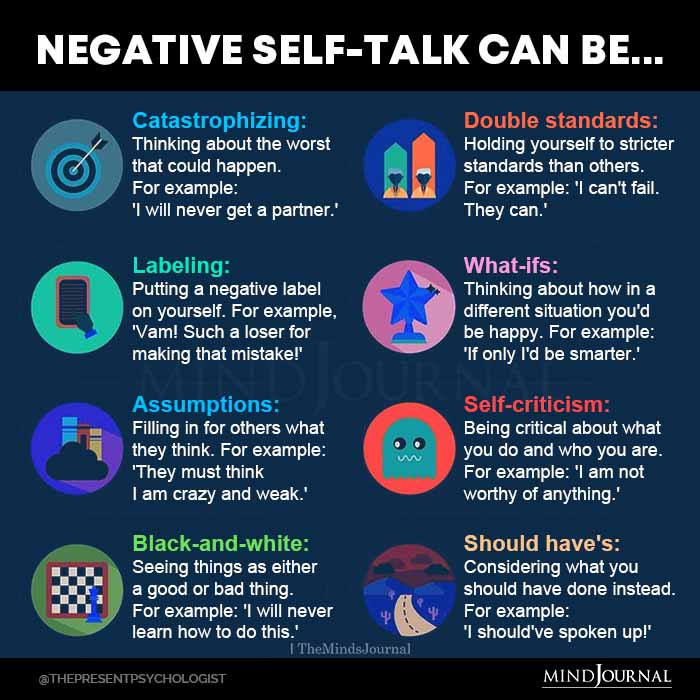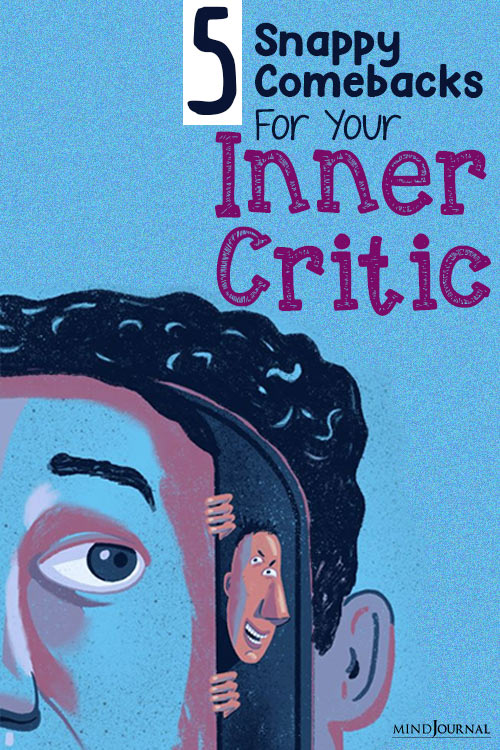Listening to your inner critic is sometimes a good idea, as it can help you stay humble and on the right path. But if you constantly listen to your inner critic and let it control you and make you feel like you are not talented enough or smart enough, then that’s when it becomes a problem. Not letting your inner critic control your life completely is the key to your happiness and confidence.
5 Snappy Comebacks for Your Inner Critic
1. I know what you are.
You sound like the voice of reason, blasting reasonable-sounding commentary such as no one likes me and I suck.
But you are not a voice. You are a neurochemical misfiring, a mistake. You are my limbic system refracted through depression, low self-esteem, trauma and/or perfectionism, fixating on negativity, misreading situations as disastrous when they’re not.
My brain is wired this way. Studies show that harsh inner critics often afflict those raised amidst rejection, shaming, hyper discipline, restriction, unrealistic expectations, violence, prejudice, neglect—fill in the blanks.
My overworked amygdalae overreact to every real and imagined stimulus, siren-signaling Dangerdangerdanger to my paleomammalian thalamus, which signals other body parts to spurt adrenaline and cortisol: stress-hormones that helped our ancestors spear bears. Largely unconsulted in this process is my poor prefrontal cortex, home of reasoning.
I should not call you “you,” because you’re not an entity. You’re just a symptom, side effect, or sickness and thus merit no more personal a pronoun than blisters or sprains. At least blisters and sprains tell me the truth.
Related: 8 Struggles Of People Who Are Too Hard On Themselves
2. You mean well, jerk.
You do the prehistoric chore of warning me. You are that brilliant innate live-die threat-detector insta-calculating camouflages, escape routes, surrender strategies, and battle plans. High alert is your default.
You gauge every circumstance as looming doom, then tell me in whichever tone and words you think will work—scathing, snide, screams, faux-innocent, friendly, resigned—whatever you think will lessen my chances of potential pain.
Hollering Quit! is twisted limbic-logic, tough-love harm-reduction. You’re unqualified! protects me from comparisons, competition, rejection. Shut up! means: In silence, we are safe.

3. You’re wrong.
This is the hardest thing to say because you sound so right. Omnipresent, using my accent … Aren’t you me?
Seeking solely worst-case scenarios, you cannot accurately assess anything. Offering just two options, fight or flight, you disallow all positive and even neutral possibilities. You scan not only tangibles — this coat, this car — but the hazy frontiers of memory and fantasy. You’ll run with anything that suits your means.
If human, you would be a wicked mimic. If autonomous, original, external: vicious enemy. But no—you are distortion: wavelengths, hormones, instant and insistent, mainly subconscious yet urgent and adroitly site-specific: I bungled that interview. I smell.
Given the unrelenting sameness of your signals—Dangerdangerdanger whatever the situation, teacup to tsunami—you cannot statistically always be right. Thus sometimes you are wrong. I will cling like a castaway to the raft of your dubiosity.
Related: 4 Kinds of Self-Criticism You Must End Now
4. OK, you might be partly right.
A teensy spark of truth sometimes ignites your hellfire. Maybe my friend really ghosted me. Silence seems proof.
But wait! Maybe I do deserve that job you say I’m stupid to pursue. Maybe I could win that contract today, thus rendering you wrong. But—just mayyyybe—further research and rehearsals would increase my chances of success, proving you somewhat right. Do I want that job, anyway? Or am I chasing it to please others or prove some passé point?
My task is seeking that spark, shining on the line between your wild sirens and intuition. This is the next-hardest thing.
My task is not to trust you. Rather it is to reduce your volume, distracting myself from you as one would from a random shrieker in the street. My task is to insert competing commentaries however dull or absurdly hopeful these might sound, while gleaning micrograms of solid evidence about the circumstance at hand, about myself and everything, wherever possible.

5. I might forgive you.
Lucky people, lacking vicious inner critics, sometimes tell themselves nice work or that was fun or what an interesting fish. Their pleasure stays unpoisoned their interactions seem to them uncatastrophic and their nearly every word goes unregretted.
These, the lucky unafflicted who cannot fathom a kind of mental malware that impersonates its hosts, might tell us: Just stop doing that.
Related: Self Abuse: 7 Ways You Can Stop Abusing Yourself And Practice Self Love
We try. Fighting our own brains with our own brains is a hard war. Overworked amygdalae, like coughs and migraines, mean no harm.
Written By S.Rufus Originally Appeared On Psychology Today









Leave a Reply
You must be logged in to post a comment.